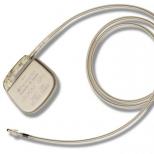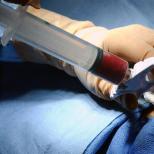Tip 1: How to challenge the diagnosis
You will need
- - medical report on the state of health;
- - outpatient card of the patient;
- - an extract from the medical hospital card;
- - written results of laboratory tests;
- - written results of diagnostic tests;
- - compulsory medical insurance policy;
- - Passport of a citizen of the Russian Federation or a document replacing it.
Instruction
Check with your doctor for all the details. Russian legislation guarantees every citizen the opportunity to obtain information about his health in an accessible form. Your doctor, of course, knows about this. Feel free to ask questions. You need to understand what exactly is going on with your body and why the medical professional thinks so. Be sure to specify whether the symptoms found in you are inherent in only one diagnosis, whether there is a need for an additional examination, whether it is possible to continue monitoring for a more accurate diagnosis.
Do not leave until you have received complete and understandable information about your health. If, upon hearing the diagnosis, you are worried or upset, tell your doctor about it. Explain that you need time to think and agree on a date for the next visit. Use the resulting break to rethink the words of the doctor and analyze your own feelings. When you talk again, ask any additional questions you have. As a result, you must absolutely understand the position of the doctor and prepare your own arguments against the diagnosis.
Gather documents describing your state of health: a written conclusion on the examination, an outpatient card, the results of a diagnostic study, etc. They should be given to you (at your request) in any medical institution. Make copies of all certificates that can be left as confirmation of your words in higher authorities.
Contact the head of the medical institution in which you were given a conclusion about the presence of the disease. Explain to the official why you doubt the correctness of the diagnosis. Maybe the doctor does not have sufficient competence from your point of view, or he was negligent about diagnostic measures. Show the conclusions of other medical specialists, if you yourself turned to them for help.
Write a written statement addressed to the head of the medical institution with a request for an additional examination in order to clarify the diagnosis. Make two copies of the document. Send one to the office. On the second, you should put a mark on the acceptance of the application for consideration. In case of a negative decision, ask for a refusal in writing.
Appeal against the actions of the employees of the medical institution. To do this, contact the regional health department or the regional branch of the Federal Service for Supervision of Health and Social Development (Roszdravnadzor). If you also did not get the desired result in these bodies, use the constitutional right to restore justice in court. After examining all the circumstances, the court may decide on the appointment of an independent medical examination. Based on its results, the diagnosis will either be confirmed or withdrawn as untrue.
note
The diagnosis made to minors and incompetent citizens can be challenged by their parents or guardians.
Useful advice
Consult a lawyer with experience in medical cases. He will help to competently draw up a statement of claim, explain the intricacies of the passage of such processes.
Sources:
- Roszdravnadzor
Diagnosis"schizophrenia" is put on the basis of the results of examinations, conversations, tests. Schizophrenia is a split personality and consciousness. An accurate diagnosis can only be made during an exacerbation, when the patient can behave very inappropriately, for example, say that he is Napoleon and leads troops under his leadership. But this is, of course, an extreme case. Outside the exacerbation phase, a schizophrenic can behave quite adequately and is no different from healthy people. This diagnosis can be removed only after a long examination.
Instruction
Diagnosis"schizophrenia" was given to you as a result of objective reasons and a long examination. You are registered in a psychiatric dispensary, and everyone who is registered for any disease in any medical institution is required to systematically visit a doctor for a routine examination and prescribing or correcting maintenance therapy.
Diagnosis can only be put by a psychiatrist by decision of the medical commission. Only a medical commission of psychiatrists can remove the diagnosis. Since there are a number of restrictions with a diagnosis of schizophrenia, for example, you cannot drive vehicles, obtain a firearms permit, work in places of increased responsibility for the life and health of people, it is natural that many patients want to get rid of this diagnosis.
If you want the diagnosis to be removed, contact the psychiatrist with whom you are registered. You will be given a series of examinations and medical tests. But you can be examined to remove the diagnosis only if you have not had periods of exacerbation for 5 years, you have come to an outpatient appointment on time, you have not received maintenance therapy with antipsychotics and antidepressants, and you have never applied for drug treatment for alcohol or drug poisoning (37 of Law 3185 on psychiatric care for the population of the Russian Federation).
First of all, the members of the commission are obliged to conduct a conversation with your relatives and friends. You will be given a series of tests designed by MDs in the field of psychiatry. They will also prescribe general tests, analysis of cerebrospinal fluid, radiography, encephalography, tomography and ultrasound of the brain. You will have an hour and a half conversation with various questions related to testing.
If all the results of the tests show complete mental health and adequacy, then the diagnosis can be removed.
But if the commission decides that it is impossible to remove the diagnosis, then it is completely useless to dispute this. Courts are not competent to consider these issues.
note
How does a schizophrenic behave? The clinic of schizophrenia is represented by a wide range of psychopathological manifestations. The most typical are violations of the intellect and emotions. With mental disorders, patients complain of the inability to concentrate thoughts, difficulties in mastering the material, an uncontrollable stream of thoughts, blockage or cessation of thoughts, parallel thoughts.
Useful advice
A person can turn on the music very loudly, as if trying to drown out something that annoys him. In this case, you must behave very calmly and in no case laugh at him. Remember that during an attack, it seems to the schizophrenic that everything that happens to him is real. Therefore, it is better to ask what he sees and hears now, what annoys him.
Translated from Greek, the word diagnosis' means knowing and distinguishing one from the other. In medicine, this term refers to the recognition of a disease. At the same time, it is important not only to indicate the nosological form of the disease, its stages and complications, but also to summarize all knowledge about the patient's condition. The resulting set of information about the patient allows the doctor to proceed directly to treatment.

Instruction
At the first stage, the doctor makes a preliminary diagnosis. To do this, conduct a detailed survey of the patient, or an anamnesis. When and how the disease began, what complaints appeared in the first place, what happened as the disease progressed, where the patient went and what he did. Those. collect a complete picture of what is happening with the patient based on his subjective feelings.
After receiving the first indicative data, conduct a physical examination. This concept includes a simple inspection without the involvement of additional techniques. Listen to breathing and heart sounds, palpate the abdominal cavity, determine the size of the liver and kidney tenderness during percussion, examine the tongue and oral cavity, feel the peripheral lymph nodes, measure blood pressure and temperature, and so on, depending on the nature of the patient's complaints. After receiving the inspection data, put a preliminary diagnosis.
Next, decide on the tactics of treatment, it must be started before receiving the final clinical and laboratory data, this is the next stage. Clinical diagnosis placed after the results of obtaining data from laboratory tests of blood and urine, bile, cerebrospinal fluid, radiographs, MRI, bacterial cultures and other research methods. These data are necessary to substantiate the preliminary diagnosis a, its detailing and clarification of treatment tactics.
During treatment, clinical diagnosis may change. Complications of the disease may be added, the stage of the process may change, etc. Add this data to diagnosis as test results and patient response to treatment become available. Thus, not only the justification of your diagnosis a, but also evaluates the effectiveness of the therapy. definitively substantiated diagnosis taking into account all the features of the course of the disease, each individual patient receives at discharge.
In the event that the results of a forensic examination are in doubt, the applicant has every right to challenge it in full or in certain parts of it. This is an inalienable right of every citizen, in the implementation of which he can be helped by repeated expert research.

Instruction
Contact another company for a re-examination. Make sure she is licensed to provide expert services. Entrust the re-examination to experts who are not interested in any outcome of the case. At the same time, the organization must carry out all the same stages of the previous examination, which will help to eliminate or identify possible errors.
At the end of the study, you will receive an expert opinion and advice from specialists, on the basis of which you can challenge the dubious examination. The conclusion must be drawn up in the prescribed manner so that it has legal force in court. By the way, the judge can also appoint the same actions if he doubts the reliability of the expert opinion. He just needs to be convinced of it.
Contact an independent expert to write a review of the conclusion of the initial examination. This service does not mean that the specialist will conduct a re-examination. Only a conclusion will be given on the quality of the initial examination. This will be another way to challenge the expertise.
From the review you will learn all the details of compliance or non-compliance of the initial examination with the norms, rules and instructions. Also, there will be clarifications on the issue of contesting a low-quality examination. This review can seriously affect the professional opinion about the competence of the expert and can be used in court.
File a petition with the judicial authorities, detailing the reasons for distrusting the results of the initial examination and request a re-examination if for some reason you did not do this earlier. Attach the results of the re-examination or a review of the initial expert study to the application. The court may refuse to satisfy the application, but will have to justify its refusal.
Often the body gives signals about a particular disease that people do not take seriously. However, there are situations that require the immediate help of a specialist, otherwise serious consequences are possible.

Instruction
Watch for changes in weight. If you are not on a diet, this is a cause for concern. Rapid weight loss can signal many diseases. For example, hyperthyroidism, a disease in which the thyroid gland produces an excess amount of hormones. In adulthood, rapid weight loss can be triggered by oncological diseases.
Do you often get SARS? Then watch how long the cough lasts. It performs a protective function - during the discharge of sputum, the bronchi and lungs are cleared. However, if the symptom becomes prolonged and lasts more than 3 weeks, this may be a sign of a serious pathology. For example, pneumonia, bronchial asthma, tuberculosis, oncological diseases. Visit a doctor.
See if there are any changes in feces. Blood can occur with hemorrhoids, anal fissure, polyps in the intestines. Black stools can be caused by taking certain foods (eg, beets, grapes, prunes) or medications (activated charcoal, iron, vitamin-mineral complexes). If the color has changed for no apparent reason, it is possible that there is internal bleeding in the body, provoked by serious diseases of the gastrointestinal tract. Be sure to consult with a coloproctologist.
Calculate how much liquid you drink per day. If thirst arises for no apparent reason and forces you to drink 2-3 liters of water per day, this is an alarm signal. Consult an endocrinologist to rule out diabetes. Other causes include kidney and thyroid disease.
Keep a schedule of your menstrual cycle. Unplanned bleeding can begin due to hormonal fluctuations, unbalanced nutrition or following strict diets, taking oral contraceptives and other reasons. Contact your gynecologist immediately.
Think about how often you have heartburn. It can be caused by many reasons, but the main one is overeating. When





